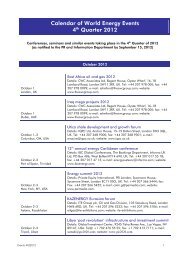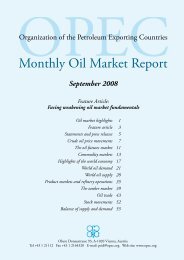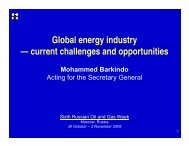Create successful ePaper yourself
Turn your PDF publications into a flip-book with our unique Google optimized e-Paper software.
<strong>OPEC</strong> bulletin 6/08 Cover Feature<br />
16<br />
skilled personnel. The main shortage area is for technical<br />
specialists, in particular engineers, though the survey<br />
highlights that there is a wide variety of skills being<br />
in short supply.<br />
The survey of senior energy company management,<br />
individual employees and human resource specialists,<br />
conducted between 2005 and 2007, also found that<br />
around 50 per cent of the international energy workforce<br />
is expected to leave the industry in the next decade,<br />
mostly through retirement. At the same time, internal<br />
training programmes are not delivering enough personnel<br />
to replace them at the senior level, despite the fact<br />
that the majority of company respondents see quite substantial<br />
future growth in staff size.<br />
The figures are clear and the potential implications<br />
could lead to much head scratching and many sleepless<br />
nights. Imagine, having to replace half your workforce in<br />
the next ten years!<br />
For many, there are significant challenges ahead. In<br />
fact, a survey of energy industry human resource leaders<br />
by Ernst & Young, reveals that the difficulty of adequately<br />
replacing skilled and experienced workers is considered<br />
one of the “top five business challenges” for growth.<br />
What is also apparent is that there is no real shortterm<br />
solution. The general industry perception is that<br />
quick “band-aid fixes” are not the answer. The industry<br />
must look long-term. The expected major future oil and<br />
gas developments, the renewables evolution and any<br />
possible rebirth of the nuclear industry, will not happen<br />
overnight. It is an industry that is usually characterized<br />
by long lead times, and often long payback periods,<br />
which means it needs employees that view the industry<br />
as a long-term profession. As the Energy Institute report<br />
states: “It cannot behave like a boom and bust industry,<br />
but must invest in its people if it is going to keep up in<br />
the technology stakes.”<br />
The question is: how can the industry find, hire,<br />
train and keep talented people?<br />
Ways forward<br />
Shutterstock<br />
The Energy Institute report offers up a number of recommendations,<br />
with a particular focus on employers making<br />
the industry more attractive. This might be through company<br />
employment policies, remuneration packages, and<br />
re-skilling and cross-training to combat the accompanying<br />
decline in scientific, engineering and technical (SET)<br />
skills possessed by new entrants. The industry needs to<br />
be well presented as a prime employment choice.<br />
Additionally, it will be important for the industry to be<br />
more innovative in its methods of training and development<br />
employed, looking for efficient and effective ways<br />
of benchmarking employees’ competence and giving<br />
them the experiences and support to develop the skills<br />
required. Training needs to be focused and tailored for<br />
both individuals and companies.
















